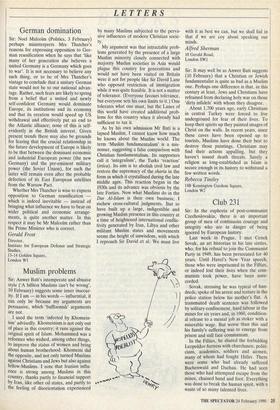LETTERS German domination
Sir: Noel Malcolm (Politics, 3 February) perhaps misinterprets Mrs Thatcher's reasons for expressing opposition to Ger- man reunification when he says that 'like many of her generation she believes a united Germany is a Germany which goes to war'. It is not necessary to believe any such thing, or to be of Mrs Thatcher's vintage to conclude that a unitary German state would not be to our national advan- tage. Rather, such fears are likely to spring from a belief that a united and newly self-confident Germany would dominate Europe, its institutions and its economy and that its creation would speed up US withdrawal and effectively put an end to the Atlantic alliance; none of this is self- evidently in the British interest. Given present trends there may also be grounds for fearing that the crucial relationship in the future development of Europe is likely to be that between the dominant economic and industrial European power (the new Germany) and the pre-eminent military power (the Soviet Union), for such the latter will remain even after the probable defection of its East European satellites from the Warsaw Pact.
Whether Mrs Thatcher is wise to express opposition to German reunification — which is indeed inevitable — instead of bringing what influence we have to bear on wider political and economic arrange- ments, is quite another matter. In this respect it may be Mr Malcolm rather than the Prime Minister who is correct.
Gerald Frost
Director, Institute for European Defence and Strategic Studies, 13-14 Golden Square, London W1


















































 Previous page
Previous page